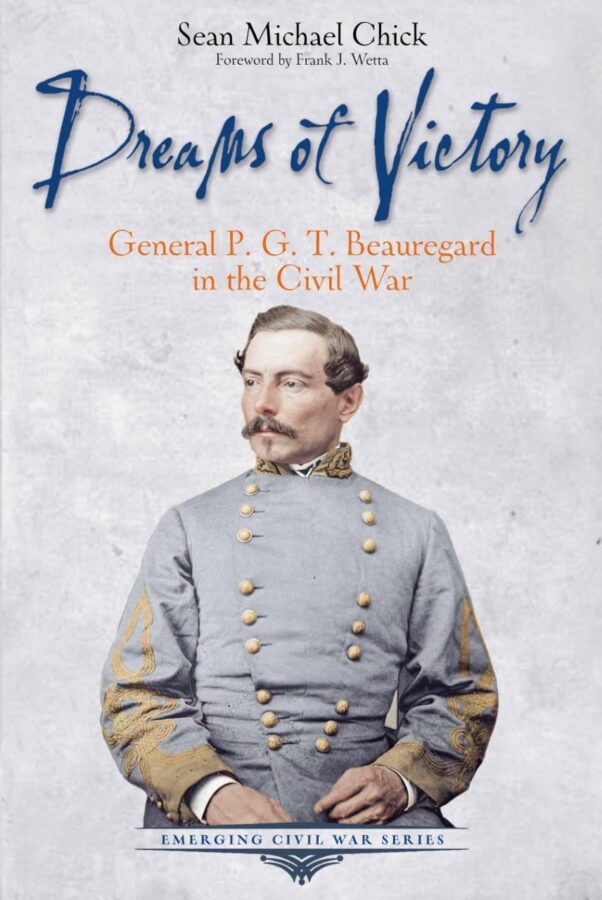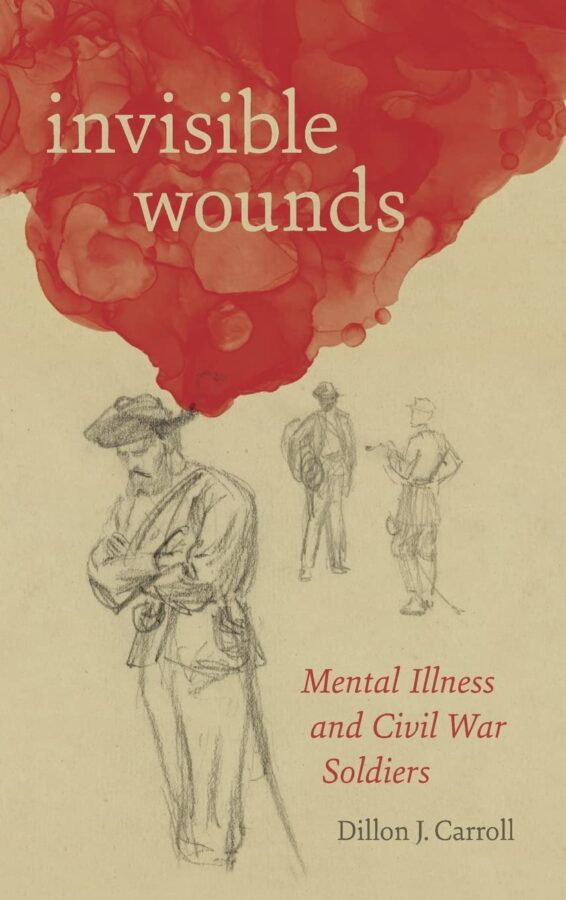Dreams of Victory: General P.G.T. Beauregard in the Civil War by Sean Michael Chick. Savas Beatie, 2022. Paper, ISBN: 978-1611215212. $16.95.
 Among Southerners of the Civil War generation, no Confederate general inspired as much debate and strong feelings as Pierre Gustave Toutant Beauregard; he was either loved or hated. History, however, is passing a harsher judgment on Beauregard than his contemporary enemies could have: he is drifting into obscurity. Author Sean Michael Chick is trying to reverse this trend. Dreams of Victory: General P.G.T. Beauregard in the Civil War is a well-written introduction to the life and career of Louisiana’s general. It is Chick’s third book on the Civil War. His previous titles both dealt with battles in which Beauregard emerged as the victorious commander. A biography of Beauregard was a natural next step.
Among Southerners of the Civil War generation, no Confederate general inspired as much debate and strong feelings as Pierre Gustave Toutant Beauregard; he was either loved or hated. History, however, is passing a harsher judgment on Beauregard than his contemporary enemies could have: he is drifting into obscurity. Author Sean Michael Chick is trying to reverse this trend. Dreams of Victory: General P.G.T. Beauregard in the Civil War is a well-written introduction to the life and career of Louisiana’s general. It is Chick’s third book on the Civil War. His previous titles both dealt with battles in which Beauregard emerged as the victorious commander. A biography of Beauregard was a natural next step.
Beauregard’s life and career were similar to that of other senior Confederate generals. He was born into the aristocratic, plantation-owning elite of the antebellum South. Beauregard, however, was from the Louisiana Creole elite—a culture distinct from the Ango-Virginia elite that dominated the Confederate armies. Beauregard was a career army officer. Like most Civil War generals, he was West Point educated and a veteran of the U.S. War with Mexico. Beauregard had an incredibly successful antebellum career. When his home state seceded, Beauregard was the commandant of West Point, making Beauregard the most prominent soldier to resign his post. That prominence increased when Beauregard was given command of Confederate forces in Charleston. The first shots of the Civil War were fired here, and the Confederacy won its first victory. It earned Beauregard fame and applause in the South and hatred in the North.
According to Chick, what made Beauregard so controversial among Southerners was his direct involvement in two of the biggest “what might have beens” of the Civil War. Post-war Southerners and believers in the Lost Cause mythology love to point out how close the Confederacy came to victory if only a slightly different decision had been made or if events had played out slightly differently.
Beauregard commanded Confederate forces at the First Battle of Bull Run. It was a decided Confederate victory and made Beauregard a hero to the Southern public. Very quickly, however, critics began to question Beauregard’s decision not to drive the defeated federal forces back to Washington, D.C., thus most likely ending the Civil War in the summer of 1861. Of course, it was a more complicated situation than is often presented. The victory could have still been turned into a defeat, and the Union army was not nearly in the disarray that it is often portrayed. Beauregard was in the middle of this controversy. Many of his critics blamed Beauregard’s timidity for denying the Confederacy the decisive victory. Among these critics was Confederate President Jefferson Davis.
The second major “what might have been moment” was the battle of Shiloh. In one of the deadliest battles of the war, the Confederates hoped to crush the federal forces in the West under Ulysses S. Grant. The Confederate troops were under the command of Albert Sydney Johnston. President Davis and many others felt Johnston was the Confederate general who would bring them victory. Johnston caught Grant’s forces by surprise, and at the end of the first day of fighting, it looked like a Confederate victory. Unfortunately for the South, Johnston was killed at the end of the first day, and Beauregard assumed command. The second day of Shiloh was a decided Union victory, and the Confederates lost a great opportunity. It was natural to argue that if Johnston had not been killed, he would have been victorious on the second day. If Johnston’s death led to Confederate defeat, it only meant that Beauregard was responsible. But this is a highly problematic argument. Union reinforcements had arrived during the night, and Grant was planning on taking the offensive the second day. There was little that Johnston could have done to bring a victory on that second day. But for Beauregard to defend himself against claims that he lost Shiloh, he had to attack the heroic martyr of the Lost Cause.
The controversies of Shiloh and Manassas overshadowed Beauregard’s successes later in the war. His victory at Bermuda Hundred and his successful defense of Petersburg bought the Confederacy an extra year of life. Regardless, at the end of the war, he would be remembered for Shiloh and the failure to push forward at Manassas.
Civil War biographers often do not pay enough attention to the interesting question of how Confederates made their way in the postbellum world. Even though Dreams of Victory was only a brief biography, Chick adequately covers this aspect of Beauregard’s life. He returned to New Orleans and, through a railroad presidency and short stint as head of a controversial lottery, Beauregard grew wealthy again. He dabbled in politics, and although he did not go as far as Longstreet and become a Republican, he did push for civil rights in the postwar period. Beauregard lived until 1893. Edmund Kirby Smith was the only full Confederate general to outlive Beauregard, although he caught a cold at Beauregard’s funeral and died a month later.
Unfortunately, biographies of Civil War generals have been out of fashion in academia for a while. The last full-length biography of Beauregard was written in the 1950s. Too much of our understanding of the Civil War has changed to let that much time pass without reexamination. Sean Michael Chick’s brief biography is a good start. Dreams of Victory asks some interesting questions and brings to life the old controversies. Hopefully, it will motivate another historian to write a more in-depth biography, if not Mr. Chick himself.
Wesley Moody is Professor of History at Florida State College at Jacksonville.
